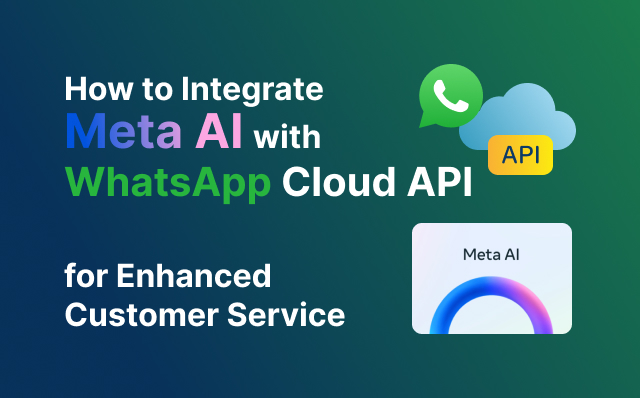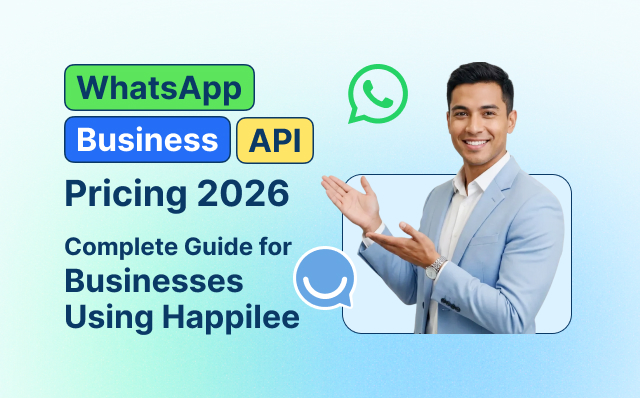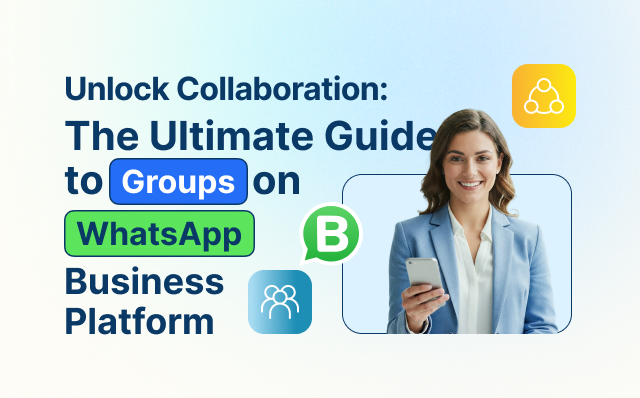In today’s digital era, exceptional customer service is crucial for maintaining a competitive edge. Customers expect prompt, accurate, and personalized responses, and businesses that fail to meet these expectations risk losing them. One effective way to achieve superior customer service is by integrating advanced AI technologies with popular communication platforms.
Meta AI, developed by Meta, uses cutting-edge machine learning algorithms to provide human-like responses to customer inquiries. It can handle high volumes of interactions, learn from each interaction, and provide personalized assistance based on customer history.
WhatsApp is a widely used messaging platform with over 2 billion users. Its WhatsApp Cloud API allows businesses to integrate WhatsApp messaging into their systems, enabling automated responses, media sharing, and real-time communication.
Combining Meta AI with the WhatsApp Cloud API creates a powerful solution for enhancing customer service. This integration streamlines communication, ensuring customers receive timely, relevant, and personalized support at any time.
In this blog, we will explore the benefits of integrating Meta AI with WhatsApp Cloud API, the steps to set up this integration, and best practices to maximize its potential. Whether you’re a small business or a large enterprise, this guide will help you leverage these technologies effectively.
Understanding Meta AI and WhatsApp Cloud API
Meta AI
Meta AI is an advanced artificial intelligence platform developed by Meta that utilizes machine learning to provide intelligent and contextual responses to customer interactions. This technology is designed to mimic human conversation, offering a seamless and natural interaction experience for users. Here are some key features and capabilities of Meta AI:
- Automated Customer Interactions: Meta AI can handle a wide range of customer queries automatically, providing instant responses to frequently asked questions and common issues. This reduces the workload on human customer service agents and ensures that customers receive timely assistance.
- Contextual Understanding: Unlike traditional chatbots that follow scripted paths, Meta AI uses natural language processing (NLP) to understand the context of a conversation. This allows it to provide more accurate and relevant responses based on the customer’s input.
- Learning and Adaptation: Meta AI continuously learns from past interactions, enabling it to improve its responses over time. This adaptive learning process helps the AI become more effective at addressing customer needs and predicting future inquiries.
- Personalization: By analyzing customer data and interaction history, Meta AI can offer personalized responses and recommendations. This level of customization enhances the customer experience and builds stronger relationships.
WhatsApp Cloud API
WhatsApp Cloud API is a robust application programming interface provided by WhatsApp that allows businesses to integrate WhatsApp messaging into their systems. This API supports a wide range of functionalities, making it a powerful tool for enhancing customer service. Key features of WhatsApp Cloud API include:
- Message Handling: The API allows businesses to send and receive text messages, images, videos, documents, and other media files through WhatsApp. This versatility enables comprehensive and engaging communication with customers.
- Automated Responses: Businesses can set up automated responses to common queries, ensuring that customers receive immediate replies even outside of business hours. This feature helps maintain high levels of customer satisfaction and engagement.
- Rich Media Integration: WhatsApp Cloud API supports rich media content, allowing businesses to share product images, promotional videos, brochures, and other multimedia elements. This enhances the overall customer experience and provides more detailed information.
- Real-Time Notifications: The API can be configured to send real-time notifications to customers, such as order confirmations, shipping updates, appointment reminders, and more. These timely updates keep customers informed and reduce the need for manual follow-ups.
- Secure Communication: WhatsApp Cloud API ensures secure and encrypted communication between businesses and customers. This security measure builds trust and ensures that sensitive information is protected.
Benefits of Integrating Meta AI with WhatsApp Cloud API
Integrating Meta AI with WhatsApp Cloud API offers numerous advantages that can transform customer service operations. Here are the key benefits, elaborated:
Improved Response Times
One of the primary benefits of integrating Meta AI with WhatsApp Cloud API is the significant reduction in response times. With AI handling initial customer interactions, queries can be addressed almost instantaneously. This immediate response capability is crucial in today’s fast-paced world, where customers expect quick answers to their questions.
- Instant Replies: Meta AI can provide instant responses to common queries, ensuring that customers do not have to wait for a human agent to become available.
- Efficiency: The AI can manage multiple conversations simultaneously, ensuring that no customer is left waiting in a queue.
This efficiency leads to higher customer satisfaction as customers receive prompt and accurate information when they need it.
24/7 Availability
AI systems do not require breaks or sleep, which means Meta AI can operate around the clock. This 24/7 availability is a significant advantage for businesses that have customers in different time zones or those that operate in industries where customer queries can arise at any time.
- Continuous Support: Customers can get help at any hour of the day or night, even outside regular business hours.
- Global Reach: Businesses can cater to international customers without worrying about time differences, ensuring support is always available.
This round-the-clock support enhances the customer experience, as they can always rely on the business to provide assistance whenever needed.
Personalized Interactions
Meta AI can analyze past interactions and customer data to deliver personalized responses. Personalization is a key driver of customer satisfaction and loyalty, as customers appreciate when businesses recognize their unique needs and preferences.
- Customer Insights: By leveraging data from previous interactions, Meta AI can understand customer preferences, purchase history, and common queries.
- Tailored Responses: The AI can provide customized recommendations, offers, and solutions based on individual customer profiles.
Personalized interactions make customers feel valued and understood, fostering a stronger connection with the brand.
Scalability
As businesses grow, so does the volume of customer inquiries. Integrating Meta AI with WhatsApp Cloud API allows businesses to scale their customer service operations without a proportional increase in human resources.
- Handling High Volumes: Meta AI can manage a large number of simultaneous interactions, ensuring that all customers receive attention, regardless of how many inquiries come in at once.
- Consistent Quality: The AI maintains a consistent level of service quality, ensuring that every customer receives accurate and helpful responses.
Scalability ensures that businesses can continue to provide excellent customer service as they expand, without the need for extensive hiring and training of new staff.
Cost Efficiency
Reducing the need for a large customer service team can lead to significant cost savings. Integrating Meta AI with WhatsApp Cloud API can help businesses optimize their resources and reduce operational costs.
- Lower Staffing Costs: With AI handling the bulk of customer inquiries, businesses can reduce the number of human agents required.
- Training Savings: The costs associated with training new customer service representatives can be minimized, as the AI can handle standard queries and tasks.
- Operational Efficiency: AI can perform repetitive tasks efficiently, freeing up human agents to handle more complex and high-value interactions.
Cost efficiency allows businesses to allocate resources more effectively, investing savings into other areas of growth and development.
Steps to Integrate Meta AI with WhatsApp Cloud API
1. Setting Up WhatsApp Cloud API
To start, you need to set up the WhatsApp Cloud API for your business. Here are the steps:
- Sign Up for WhatsApp Business API: Visit the WhatsApp Business API page and sign up for an account.
- Create a WhatsApp Business Account: Follow the instructions to create a WhatsApp Business Account.
- Generate API Keys: After setting up your account, generate the necessary API keys that will allow you to integrate with your systems.
For businesses seeking an enhanced integration experience, consider Happilee’s WhatsApp Cloud API. Happilee simplifies the setup process and offers additional features designed to streamline customer interactions and support. You can learn more about Happilee’s offerings and sign up for their services at happilee.io
2. Configuring Meta AI
Next, configure Meta AI to handle customer interactions:
- Access Meta AI Tools: Log in to your Meta (Facebook) account and navigate to the Meta AI tools section.
- Set Up AI Models: Choose the appropriate AI models for your customer service needs. You can customize these models based on your business requirements.
- Train the AI: Use past customer interaction data to train the AI models. This will help the AI understand common queries and appropriate responses.
3. Integration Process
Now, integrate Meta AI with WhatsApp Cloud API:
- API Integration: Use the API keys generated from WhatsApp Cloud API and integrate them with the Meta AI platform.
- Webhook Configuration: Set up webhooks to receive real-time notifications of incoming messages on WhatsApp. Configure these webhooks to pass messages to Meta AI.
- AI Response Handling: Program Meta AI to handle the incoming messages and provide appropriate responses. Ensure that the AI can handle various types of queries and provide contextual answers.
4. Testing and Deployment
Before going live, thoroughly test the integration:
- Simulate Customer Interactions: Test the system with various customer queries to ensure that Meta AI responds accurately and promptly.
- Refine AI Models: Based on testing results, refine the AI models to improve response accuracy.
- Go Live: Once satisfied with the testing phase, deploy the integrated system.
Best Practices for Using Meta AI with WhatsApp Cloud API
To maximize the effectiveness of your integrated system, follow these best practices:
Continuous Training
Regularly update and train your AI models with new data to improve accuracy and relevance. The more data the AI has, the better it can understand and respond to customer queries.
- Dynamic Learning: Incorporate new trends, common customer questions, and seasonal variations into the training data. This helps the AI stay relevant and provide up-to-date responses.
- Performance Analysis: Regularly analyze the performance of AI responses to identify areas for improvement. Use this analysis to fine-tune the AI models.
- Industry-Specific Training: Tailor the AI’s training data to include industry-specific terminology and scenarios. This ensures the AI can handle specialized queries accurately.
Monitor Interactions
Keep an eye on AI interactions to identify and address any issues promptly. Monitoring helps you catch errors or misunderstandings early and refine the AI’s responses.
- Real-Time Monitoring: Implement real-time monitoring tools to oversee AI interactions as they happen. This allows for immediate intervention if something goes wrong.
- Regular Audits: Conduct regular audits of AI interactions to ensure compliance with customer service standards and identify patterns that may require adjustments.
- Error Logging: Maintain logs of any errors or unusual interactions to analyze and address recurring issues.
Human Oversight
Ensure there is an option for customers to escalate issues to human agents when necessary. While AI can handle many queries, complex or sensitive issues may require human intervention.
- Seamless Transition: Design the system to facilitate a smooth transition from AI to human agents, ensuring customers do not experience any disruption.
- Agent Training: Train human agents to handle escalations effectively, ensuring they can quickly understand the context provided by the AI and address the customer’s needs.
- Clear Escalation Paths: Make it easy for customers to know how and when they can reach a human agent, reducing frustration during critical interactions.
Feedback Loop
Implement a feedback mechanism to collect customer feedback on AI interactions. Use this feedback to make necessary improvements and enhance the overall customer experience.
- Customer Surveys: Send follow-up surveys to customers after their interactions with the AI, asking for feedback on the quality and usefulness of the responses.
- In-Conversation Feedback: Allow customers to rate their experience or provide feedback directly within the chat interface, making it convenient for them to share their thoughts.
- Feedback Analysis: Regularly review and analyze the feedback to identify common issues or suggestions for improvement. Use this information to refine the AI’s performance.
User Experience Optimization
Ensure the AI interaction is user-friendly and enhances the customer experience.
- Clear Communication: Ensure the AI provides clear, concise, and helpful responses. Avoid overly technical language that may confuse customers.
- Personalization: Use customer data to personalize interactions, making customers feel valued and understood.
- Consistent Branding: Maintain a consistent brand voice and tone in all AI interactions to strengthen brand identity and provide a cohesive customer experience.
Security and Privacy
Protect customer data and ensure compliance with relevant regulations.
- Data Encryption: Use encryption to protect data in transit and at rest, ensuring customer information remains secure.
- Privacy Compliance: Adhere to privacy regulations such as GDPR or CCPA, ensuring that customer data is handled responsibly and transparently.
- Access Controls: Implement strict access controls to ensure that only authorized personnel can access sensitive customer information.
Scalability Planning
Plan for future growth to ensure the system can handle increasing volumes of interactions.
- Infrastructure Readiness: Ensure your technical infrastructure can support scaling up as the volume of interactions grows.
- AI Model Updates: Regularly update AI models to handle a wider range of queries and more complex interactions as your business expands.
- Performance Monitoring: Continuously monitor system performance to identify any potential bottlenecks or issues that could impact scalability.
Conclusion
Integrating Meta AI with WhatsApp Cloud API offers a transformative approach to customer service, combining advanced artificial intelligence with a widely-used messaging platform. This integration enables businesses to provide fast, accurate, and personalized customer support, ensuring a superior customer experience.
By implementing the steps outlined—setting up WhatsApp Cloud API, configuring Meta AI, integrating the systems, and conducting thorough testing—you can effectively enhance your customer service operations. The benefits of this integration include improved response times, 24/7 availability, personalized interactions, scalability, and cost efficiency.
Following best practices, such as continuous training, monitoring interactions, maintaining human oversight, and implementing a feedback loop, will help you maximize the potential of this powerful combination. Additionally, focusing on user experience optimization, security, privacy, and scalability will ensure long-term success and customer satisfaction.
In summary, leveraging Meta AI with WhatsApp Cloud API not only meets the modern demands of customer service but also provides a competitive edge in the market. This integration empowers businesses to deliver exceptional support, foster stronger customer relationships, and achieve greater operational efficiency.


